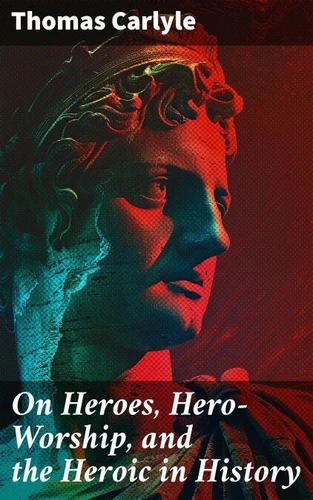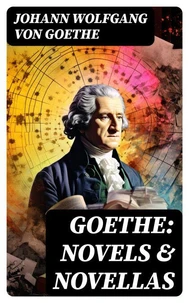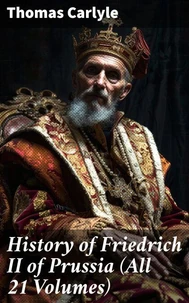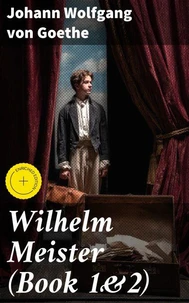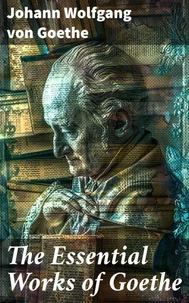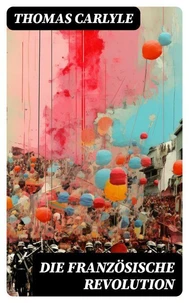On Heroes, Hero - Worship, and the Heroic in History. Exploring Hero - Worship in History and Literature
Par :Formats :
Disponible dans votre compte client Decitre ou Furet du Nord dès validation de votre commande. Le format ePub est :
- Compatible avec une lecture sur My Vivlio (smartphone, tablette, ordinateur)
- Compatible avec une lecture sur liseuses Vivlio
- Pour les liseuses autres que Vivlio, vous devez utiliser le logiciel Adobe Digital Edition. Non compatible avec la lecture sur les liseuses Kindle, Remarkable et Sony
 , qui est-ce ?
, qui est-ce ?Notre partenaire de plateforme de lecture numérique où vous retrouverez l'ensemble de vos ebooks gratuitement
Pour en savoir plus sur nos ebooks, consultez notre aide en ligne ici
- Nombre de pages219
- FormatePub
- ISBN406-633--953715-6
- EAN4066339537156
- Date de parution12/08/2023
- Protection num.Digital Watermarking
- Taille610 Ko
- Infos supplémentairesepub
- ÉditeurGOOD PRESS
Résumé
In "On Heroes, Hero-Worship, and the Heroic in History, " Thomas Carlyle delves into the nature of heroism and its vital role in shaping history and culture. Written in a thought-provoking style, this critical work combines philosophical discourse with vivid biographical sketches of historical figures, encompassing a range of personalities from Odin to Napoleon. Carlyle's exploration is set against the backdrop of the Victorian era, a period marked by profound social upheaval and a longing for authentic moral guidance amidst industrialization's chaos.
His impassioned prose encourages readers to discern the qualities that define heroism, prompting them to consider the intertwined destinies of societies and their leaders. Carlyle, a 19th-century Scottish philosopher and essayist, was profoundly shaped by the turbulent political climate of his time, as well as his own experiences with the Romantic movement. His belief in the transformative power of the individual is evident throughout this work, which not only reflects his interest in history but also embodies his aspiration for moral clarity and inspiration amidst uncertainty.
Carlyle'Äôs lifelong engagement with literature and philosophy further illuminates his motivations in crafting this profound examination of heroic figures. This book is highly recommended for readers interested in philosophy, history, and the complexities of leadership. Carlyle'Äôs insights are timeless, urging contemporary audiences to reflect on the qualities that lead individuals to greatness and the societal implications of such heroism.
By understanding the heroes of the past, readers are equipped to navigate the challenges of the present and future.
His impassioned prose encourages readers to discern the qualities that define heroism, prompting them to consider the intertwined destinies of societies and their leaders. Carlyle, a 19th-century Scottish philosopher and essayist, was profoundly shaped by the turbulent political climate of his time, as well as his own experiences with the Romantic movement. His belief in the transformative power of the individual is evident throughout this work, which not only reflects his interest in history but also embodies his aspiration for moral clarity and inspiration amidst uncertainty.
Carlyle'Äôs lifelong engagement with literature and philosophy further illuminates his motivations in crafting this profound examination of heroic figures. This book is highly recommended for readers interested in philosophy, history, and the complexities of leadership. Carlyle'Äôs insights are timeless, urging contemporary audiences to reflect on the qualities that lead individuals to greatness and the societal implications of such heroism.
By understanding the heroes of the past, readers are equipped to navigate the challenges of the present and future.
In "On Heroes, Hero-Worship, and the Heroic in History, " Thomas Carlyle delves into the nature of heroism and its vital role in shaping history and culture. Written in a thought-provoking style, this critical work combines philosophical discourse with vivid biographical sketches of historical figures, encompassing a range of personalities from Odin to Napoleon. Carlyle's exploration is set against the backdrop of the Victorian era, a period marked by profound social upheaval and a longing for authentic moral guidance amidst industrialization's chaos.
His impassioned prose encourages readers to discern the qualities that define heroism, prompting them to consider the intertwined destinies of societies and their leaders. Carlyle, a 19th-century Scottish philosopher and essayist, was profoundly shaped by the turbulent political climate of his time, as well as his own experiences with the Romantic movement. His belief in the transformative power of the individual is evident throughout this work, which not only reflects his interest in history but also embodies his aspiration for moral clarity and inspiration amidst uncertainty.
Carlyle'Äôs lifelong engagement with literature and philosophy further illuminates his motivations in crafting this profound examination of heroic figures. This book is highly recommended for readers interested in philosophy, history, and the complexities of leadership. Carlyle'Äôs insights are timeless, urging contemporary audiences to reflect on the qualities that lead individuals to greatness and the societal implications of such heroism.
By understanding the heroes of the past, readers are equipped to navigate the challenges of the present and future.
His impassioned prose encourages readers to discern the qualities that define heroism, prompting them to consider the intertwined destinies of societies and their leaders. Carlyle, a 19th-century Scottish philosopher and essayist, was profoundly shaped by the turbulent political climate of his time, as well as his own experiences with the Romantic movement. His belief in the transformative power of the individual is evident throughout this work, which not only reflects his interest in history but also embodies his aspiration for moral clarity and inspiration amidst uncertainty.
Carlyle'Äôs lifelong engagement with literature and philosophy further illuminates his motivations in crafting this profound examination of heroic figures. This book is highly recommended for readers interested in philosophy, history, and the complexities of leadership. Carlyle'Äôs insights are timeless, urging contemporary audiences to reflect on the qualities that lead individuals to greatness and the societal implications of such heroism.
By understanding the heroes of the past, readers are equipped to navigate the challenges of the present and future.

